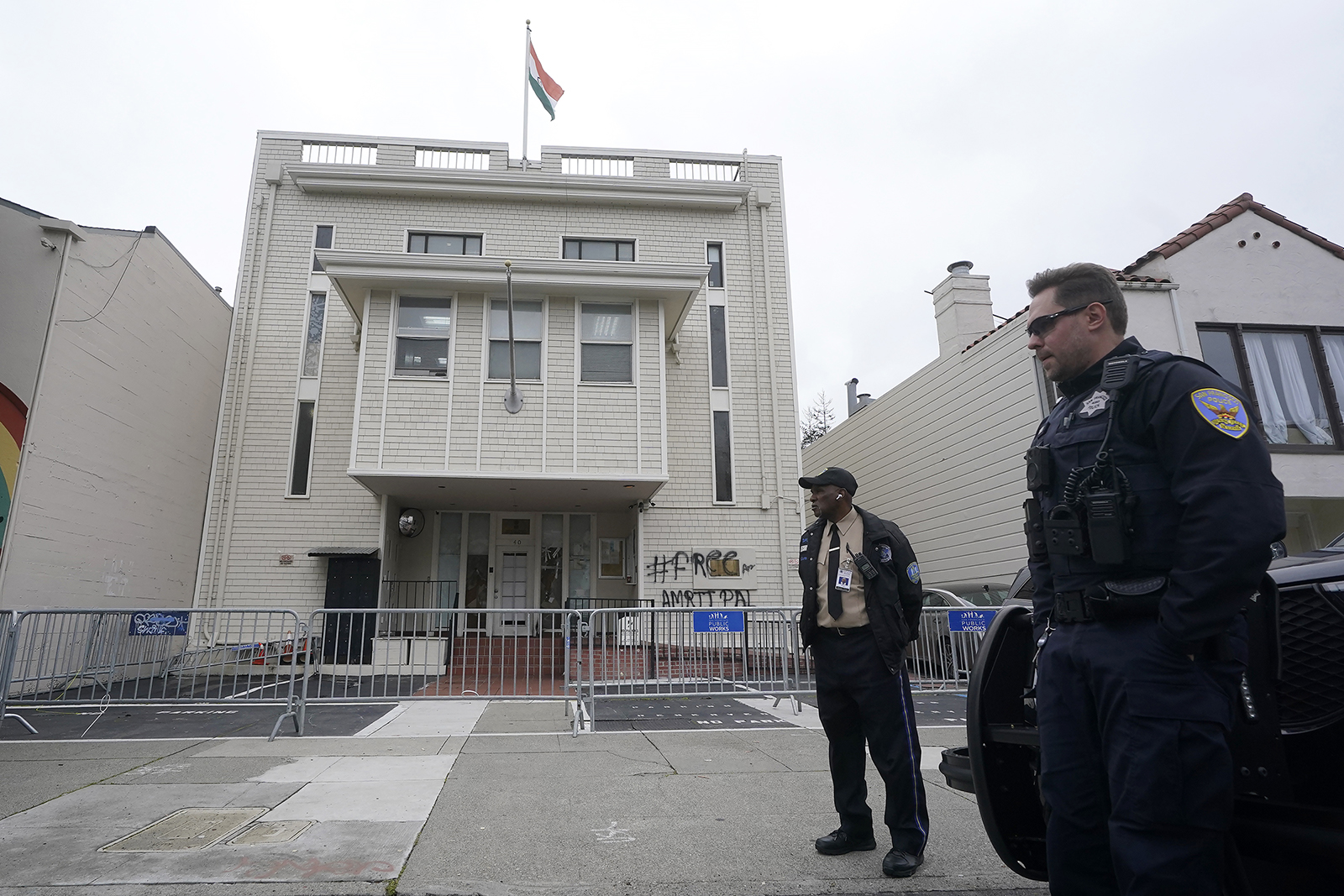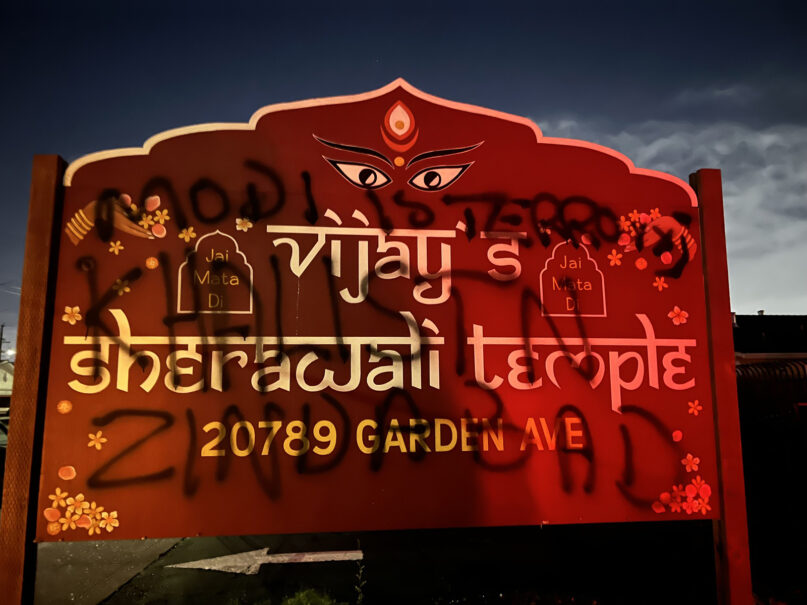(RNS) — After vandals attacked three Hindu temples in the San Franscisco Bay Area within two weeks, Hindu advocates are urging temples across the United States to increase their vigilance and security measures.
On Friday (Jan. 5), the entrance sign at Vijay’s Sherawali Temple in Hayward, California, was spray-painted with the phrases “Modi is a terrorist” and “Khalistan Zindabad,” or “Khalistan Forever.” Khalistan is the name by which Sikh separatists refer to a sovereign state they hope to carve out of the Indian state of Punjab, the historic home of Sikhi.
A few days before, in the early morning hours of Jan. 1, the Shiv Durga Temple of Santa Clara was burglarized. Cameras recorded three perpetrators stealing gold jewelry that adorned the temple’s idols plus donation boxes.
“It was a shock, because we have this belief that nothing can happen to our temple, that our gods are very strong,” said Sunil Khanna, the president of the Santa Clara temple’s board, who stayed 24 hours after the theft to purify the atmosphere. “The main thing that hurt all of us was how they misbehaved with the gods.”
On Dec. 23, the Shree Swaminarayan Temple in Newark, California, was defaced with a vulgarity aimed at Narendra Modi, India’s prime minister.
“Based on the graffiti, we believe it was a targeted act, and it’s going to be investigated with full thoroughness,” said Jonathan Arguello, police captain for the city of Newark, at a news conference.
The attacks in California come just months after the Indian Consulate in San Francisco was hit with vandalism and an attempted arson, and a year after a Mahatma Gandhi statue in front of the Shri Tulsi Mandir in New York was broken and vandalized.
The incidents point to a clear trend of anti-Hindu hate crimes, said Ramya Ramakrishnan of the Hindu American Foundation. “Community members are reaching out, asking, ‘Is it safe to go to the temple?'” she said. “This is supposed to be safe place where you go to pray and get peace of mind. But this holy and sacred space is now being violated.”
The rash of vandalism follows charges in November by the U.S. Department of Justice that an Indian government official plotted to murder a Sikh separatist leader, Gurpatwant Singh Pannun, in New York. Weeks before, the Canadian prime minister’s office accused India of involvement in the assassination of Sikh separatist leader Hardeep Singh Nijjar.
But apparent pro-Khalistani vandalism has been occurring at least since March of 2023, when news broke that protesters in San Francisco had entered the Indian Consulate, installing two small Khalistani flags inside the premises. Then, in July, the facility sustained an arson attack, leading to a subsequent intelligence raid in Punjab.
“Vandalism or violence against diplomatic facilities or foreign diplomats in the U.S. is a criminal offense,” U.S. State Department spokesman Matthew Miller said on X at the time, without mentioning Sikh separatism. An FBI spokesperson recently told Indian officials that the FBI was “aggressively investigating” the attack.

A security guard and San Francisco police officer stand in front of the entrance to the Consulate General of India in San Francisco on March 20, 2023. San Francisco police had erected barriers and parked a vehicle nearby as people protested outside the building to protest the capture of Amritpal Singh. Protesters smashed windows at the consulate and skirmished with embassy workers. (AP Photo/Jeff Chiu, File)
According to anti-Khalistani activist Puneet Sahani, the 2021 attack in Queens, where Khalistani rhetoric was also spray-painted, should have been a wake-up call for Hindus and Sikh communities to address Sikh separatist sentiment. One of the four alleged perpetrators has been charged with a hate crime, but Sahani believes authorities have not pursued the case forcefully enough.
“We had a golden opportunity to set a deterrent,” said Sahani, who is Sikh.
Sahani worries that Hindu organizations shy away from speaking out against the Khalistan movement, in fear of being labeled anti-Sikh. But Sahani said it is his duty as a Sikh to speak out against “extremists” in his community, especially because, he feels, “Hindus and Sikhs don’t have that much of a distinction” in India.
Hinduphobia, Ramakrishnan says, is yet to be fully recognized by law enforcement. Though local police and authorities stepped in immediately after the recent crimes were reported, she said, there is much more work to be done at the federal level.
“If this had happened to synagogues, if this had happened to mosques, or any other place of worship, this would be taken more seriously,” she said. “We believe there would be more swift action.”
The Hindu American Foundation, the largest Hindu advocacy organization in the U.S., regularly shares resources for temples to take preventive measures, including a manual with information about how to receive a safety assessment, as well as education on security, from CCTV cameras to alarms.
The organization also urges temples to report all incidents so that crimes involving Hinduphobia do not remain under the surface.
“We really want our Hindu community to be aware that this is happening in your backyard,” she said. “Not to be afraid, but to face this. We need to be united as a community.”
Khanna, at the Shiv Durga Temple in Santa Clara, is sure that his community can come back from these attacks. He hopes to lead a consortium for Bay Area Hindu temples in order to “put pressure on authorities” to recognize the Hindu community’s unity in the face of attacks.
“No temple should close their doors,” he said. “We all have to be alert. But we should not bow down. This is a time to stand up and rebel against the negative forces.”





